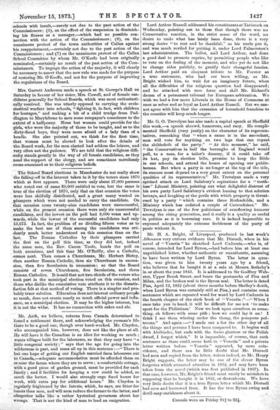The School Board electiOns in Manchester do not really show
the falling-off in the interest taken in it by the voters since 1870 -which at first appears. There were only about 27,000 persons who voted out of some 60,000- entitled to vote, but the same is' true of the election of 1870, only that on that occasion the votes were less skilfully distributed, and a great many Wasted on plumpere which were not needed to carry the candidate. On that occasion some twenty-nine candidates were unsuccessful, while, on the present occasion there were only six unsuccessful candidates, and the lowest on the poll had 8,000 votes and up- :wards, while the lowest of the successful candidates had only 13,673. In fact, the problem of so dividing fifteen votes as to make the best we of them among the candidates was evi- dently much better understood on this occasion than on the last. The Roman Catholics by their plumpers carried the first on the poll this 'time, as they did last, indeed the same man, the Rev. Canon Toole, heads the poll on both occasions, and this time Mr. O'Reilly, also a Catholic, comes next. Then comes a Churchman, Mr. Herbert Birley, then another Roman_ Catholic, then six Churchmen in succes- sion, then five Secularists in succession; so that the Board consista of seven Churchmen, five Secularists, and three Roman Catholics. Itissaid that not two-thirds of the voters who took part in the municipal election voted on this occasion, and. those who dislike the cumulative vote attribute it to the dissatis- faction felt at that method. of voting. There is a simpler and pro-. bably truer solution. Education does not interest ordinary people so much, does not create nearly so much official power and influ- ence, as a municipal eleition. It may be the higher interest, but it is not the wider. It has no connection with cakes and ale.


































 Previous page
Previous page